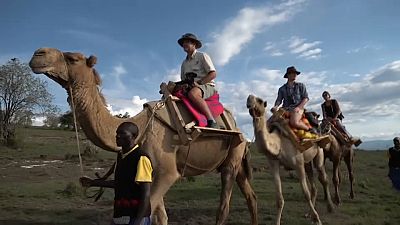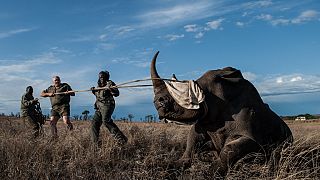Kenya
Camels are the latest mode of transport carrying tourists across Kenya's Soysambu Reserve.
The animals provide a very different experience from the all-terrain vehicles typically associated with safaris.
"I choose this method of eco-tourism over other eco-tourism options like electric vehicles, electric bikes, because even if an electric vehicle is good and we are moving forward and we are trying to get away from diesel and burning engines, but it's still a vehicle, and so you are still leaving a footprint, you are still leaving tracks" said tourist Adrien Allan.
Using camels also means the tour can get closer to more elusive creatures, such giraffes grazing in the undergrowth.
The owner of Bobong Camels, Amanda Perrett, explains why camels offer a better alternative compared to vehicles.
"The camel is very good at eating invasive species which helps the environment. And they do not leave a footprint when you walk with them and they carry everything that you need on your trip. They don't drink too much water so they can go up to five days without needing to drink", said the safari entrepreneur.
For conservationists, eco-tourism is the best way to preserve nature and resources for future generations.
"This brings nature closer to us and us closer to nature. The more close you nature the more you understand it, the more you will like it and the less that you'll not (be likely) to destroy it, the more you realise that pollution is harming the environment" explains conservationist Henry Ole Sanoi.
As customers become more environmentally-conscious, more and more companies want to offer holidays that don't harm the natural world.












02:16
Earth Day: Fighting microfibre pollution one laundry at a time
01:04
Tänak takes early lead as Safari Rally Kenya kicks off with high stakes and tough challenges
01:10
Rovanperä beats Neuville in Safari Rally Kenya shakedown
01:50
Solar-Powered Cookers offer sustainable solution in Kenya
01:54
South Africa Reports 16% Drop in Rhino Poaching, but Concerns Remain
08:30
Kenyan conservationists push for wildlife corridors amid shrinking habitats